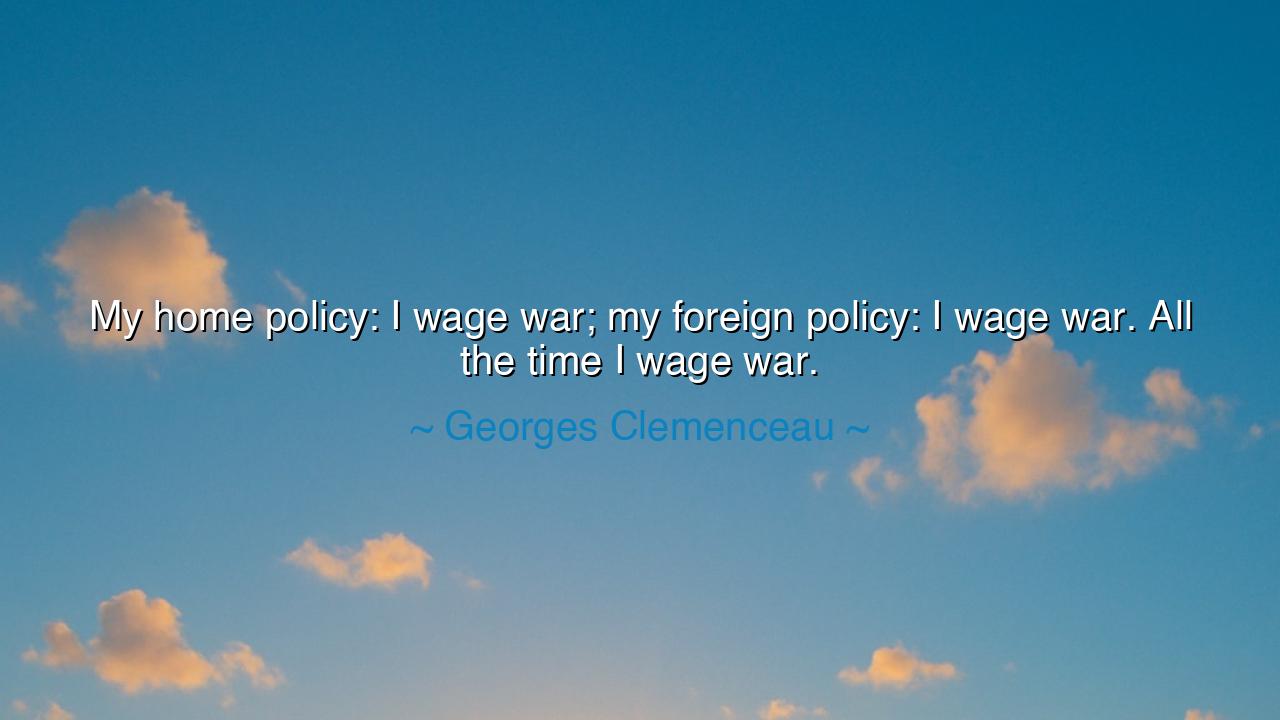
My home policy: I wage war; my foreign policy: I wage war. All






In the words of Georges Clemenceau, “My home policy: I wage war; my foreign policy: I wage war. All the time I wage war.” — there resounds the voice of a man forged in the furnace of conflict, a leader whose spirit was carved from iron and whose will refused surrender. These words, though fierce, are not merely the boast of a warrior — they are the declaration of one who understood that life itself is a battle, and that to preserve peace, freedom, and justice, one must never cease to struggle. Beneath the simplicity of his phrase lies a truth as ancient as civilization: that the greatest defenders of peace are often those who are willing to wage war against chaos, ignorance, and weakness within and without.
The origin of this quote can be traced to Clemenceau’s time as Prime Minister of France during the final and most desperate years of the First World War. France was exhausted — her sons buried, her soil scarred, her spirit nearly broken. Into this despair stepped Clemenceau, an old man of unyielding energy and conviction, known as Le Tigre — “the Tiger.” When others sought compromise, he demanded endurance; when others wished for comfort, he called for resolve. His war was not only against Germany, but against the despair within his own people. “All the time I wage war,” he said — meaning not only against enemies beyond the border, but against the forces of decay, complacency, and fear that threatened the soul of his nation.
In his words we find the essence of the warrior-statesman, a figure as old as the heroes of Greece and Rome. Like Pericles of Athens, who defended democracy through both word and sword, or Cincinnatus of Rome, who left his plow to lead his people in crisis, Clemenceau understood that peace without vigilance is illusion. His war was not of cruelty, but of duty — the war for strength, the unending struggle to protect what is sacred. He knew, as the ancients knew, that life’s highest callings demand conflict — not of blood alone, but of conviction, of will, of truth against falsehood.
Consider the story of Winston Churchill, who, decades later, would embody the same spirit. When Britain stood alone against tyranny, Churchill too waged war — not merely against armies, but against despair itself. His battles were fought with words, courage, and defiance. Like Clemenceau, he refused the false comfort of appeasement, declaring that one must “never surrender.” Both men, though different in age and era, were bound by a single truth: that to live honorably is to fight unceasingly — not for destruction, but for preservation. The peace that endures is not the peace of passivity, but the peace born of victory over injustice and weakness.
Yet, Clemenceau’s words reach beyond politics or history; they speak to the inner battlefield of every human being. Each of us, in our own way, must “wage war” — not with weapons, but with discipline, courage, and perseverance. Within the heart lies the constant struggle between light and shadow, between strength and surrender. The wise man does not seek the end of conflict, but learns to master it — to fight against despair, against indifference, against the forces that would rob the spirit of purpose. For in this life, every act of creation, every triumph of character, every victory of virtue is won through struggle.
Thus, when Clemenceau says, “All the time I wage war,” he reveals the creed of those who choose to live actively rather than idly — to face life’s storms with defiance rather than submission. He teaches that peace is not the absence of struggle, but its noble fruit. Like the blacksmith who tempers iron with flame, life forges greatness through adversity. Those who shrink from battle — whether moral, intellectual, or spiritual — become servants to fate. Those who stand and fight, though battered, become the authors of destiny.
So, what lesson shall we draw from this fiery declaration? It is this: never cease to fight for what matters. Wage war against ignorance with knowledge, against hatred with compassion, against despair with faith. Let your home policy and your foreign policy — the private and public parts of your being — both be guided by the courage to resist decline. When injustice rises, speak. When weariness comes, endure. When fear whispers, defy. For the world is not saved by the timid heart, but by those who, like Clemenceau, embrace the ceaseless labor of guardianship.
In the end, his words remind us that to live fully is to battle constantly — not in hatred, but in devotion to all that is good, noble, and enduring. The warrior’s life is not one of violence, but of vigilance. Peace, freedom, and integrity are never given; they are earned anew each day through struggle. So let us too take up the eternal fight — within our souls, our homes, and our world — and wage our wars with courage, until the day when our striving itself becomes a monument to the strength of the human spirit.






AAdministratorAdministrator
Welcome, honored guests. Please leave a comment, we will respond soon